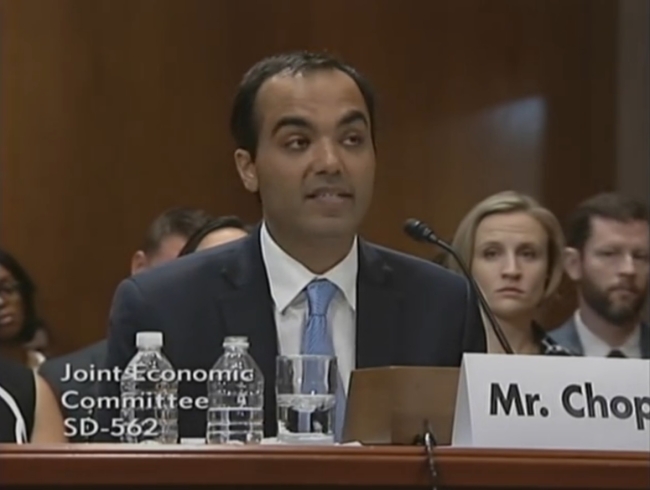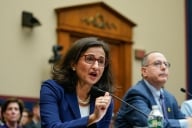You have /5 articles left.
Sign up for a free account or log in.

Rohit Chopra during a congressional hearing last year
U.S. Congress
For-profit colleges can expect continued pressure from the White House under a Clinton administration, now that two familiar critics of the sector are advising the campaign.
Rohit Chopra recently joined the Clinton transition team. Since January, the former student loan ombudsman for the Consumer Financial Protection Bureau had been a special adviser to John King Jr., the U.S. secretary of education. In addition to pursuing for-profits, Chopra has been aggressive in criticizing student loan servicers.
Less clear is the role Robert Shireman may be playing with the Clinton campaign. Shireman, a senior fellow at the Century Foundation, was deputy under secretary of education during much of the Obama administration’s first term. He led the White House overhaul of student loan programs. And as the architect of the department’s gainful employment regulation, he is one of the for-profit sector’s most influential opponents.
Shireman is advising the campaign, sources said, and appears likely to join it in some formal way, if he hasn’t already. He declined to comment for this article.
The Clinton campaign does not discuss staffing on its transition team, which consists of advisers who are preparing to run the executive branch if Clinton bests Donald Trump, the Republican nominee. A spokesperson for the campaign did not respond to inquiries about Chopra and Shireman.
The announcement of Chopra’s move to the transition team this week was cheered by consumer advocates and critics of the for-profit sector and greeted with dismay by skeptics of the Obama administration’s higher-ed policies. The emergence of Shireman’s role in the campaign -- and possibly in a Clinton department -- would further entrench the attitudes among progressive activists and policy thinkers as well as for-profit representatives.
Rumors have circulated in recent weeks among both for-profit officials and consumer activists that some kind of role in the Clinton team would be forthcoming for the former Obama deputy under secretary of education.
Trace Urdan, a for-profit sector analyst for Credit Suisse, said a Shireman announcement would be an even bigger disappointment to the for-profit sector than Chopra’s was earlier this week, he said.
“For folks that have invested in these stocks, his is a household name,” Urdan said. “If you owned Apollo stock, you know who Bob Shireman is.”
During his time in Washington, Shireman was a driving force for the new gainful employment regulations, which for-profit advocates call a killer for the industry.
Shireman has been influential on most major higher education policy issues for the last decade. He has worked on the Hill, in the Bill Clinton White House as a senior policy adviser to the National Economic Council and as the founder and former president of the Institute for College Access and Success.
In addition to his attempts to crack down on for-profits, Shireman helped create the nation's income-based student loan repayment system and played a lead role in the Obama administration's move to eliminate private lenders as middlemen in federal loan programs.
Recently Shireman has weighed in forcefully on the use of student learning outcomes in accreditation -- an exercise he calls "worthless bean counting" -- on for-profits that seek to convert to nonprofit status and on coding boot camps.
Urdan said he initially thought it was possible a Clinton administration would be more focused on its own priorities than implementing the higher ed policies of President Obama, possibly delaying enforcement of recent department decisions.
Likewise, many observers have speculated that a Hillary Clinton administration could be softer on the industry due to the $17.6 million Bill Clinton made in recent years as honorary chancellor of Laureate University, a large for-profit with a global footprint. The Chopra announcement killed those hopes, Urdan said.
“The level of pressure and the pace of enforcement that has been established under John King seems likely to continue,” he said. “I think they feel like it's something that wins for them. My idea that they're not going to be bound to the prior guy's agenda -- I had to kind of toss that idea out the window.”
Chopra served as the student loans ombudsman at the CFPB before moving to the department earlier this year for a special adviser role under King. At the bureau he was a critic of student loan servicers and of colleges for their partnerships with private lenders. He also compared the practices of for-profit colleges to those of mortgage lenders before the 2008-9 financial crisis.
Steve Burd, a senior policy analyst at New America, said it was very encouraging that Chopra would be joining the transition team.
“He has been a tremendous advocate for students. And he has played a pivotal role in focusing policy makers on the worst practices of the student loan industry and for-profit higher education,” said Burd. “There is no greater champion of students in the federal government than Rohit.”
Pauline Abernathy, executive vice president of the Institute for College Access and Success, said Chopra's appointment to the transition team shows the Clinton campaign is placing an emphasis on student debt and student loan borrowers. Chopra has demonstrated a commitment to those issues and has a record of getting things done in government, Abernathy said.
"He knows what it takes to make policy and make reforms in complex government agencies," she said. "That's critical for the transition as we think about who would be effective in a Clinton administration."
Leaders of the for-profit industry and its biggest critics are interpreting the transition team as a signal from Clinton that it won’t be a return to business as usual after Obama departs the White House.
Steve Gunderson, president and CEO of Career Education Colleges and Universities, said people define policy, and the apparent selections of Chopra and Shireman suggest continued hostility to the for-profit sector.
"There has to be a new beginning in the relationship between the sector and the next administration," he said. "If there is not, then the sector doesn't survive."
The U.S. Congress likely would not confirm Shireman's appointment to a senior role at the department, Gunderson said, because of lingering concerns among some Republicans about his last stint in Washington.
Gunderson has some optimism about a possible Clinton administration, however, despite the news about Chopra, in part because he believes there is growing support -- including from congressional Democrats -- for accountability measures to cover nonprofit colleges, too, rather than being aimed primarily at for-profits.








